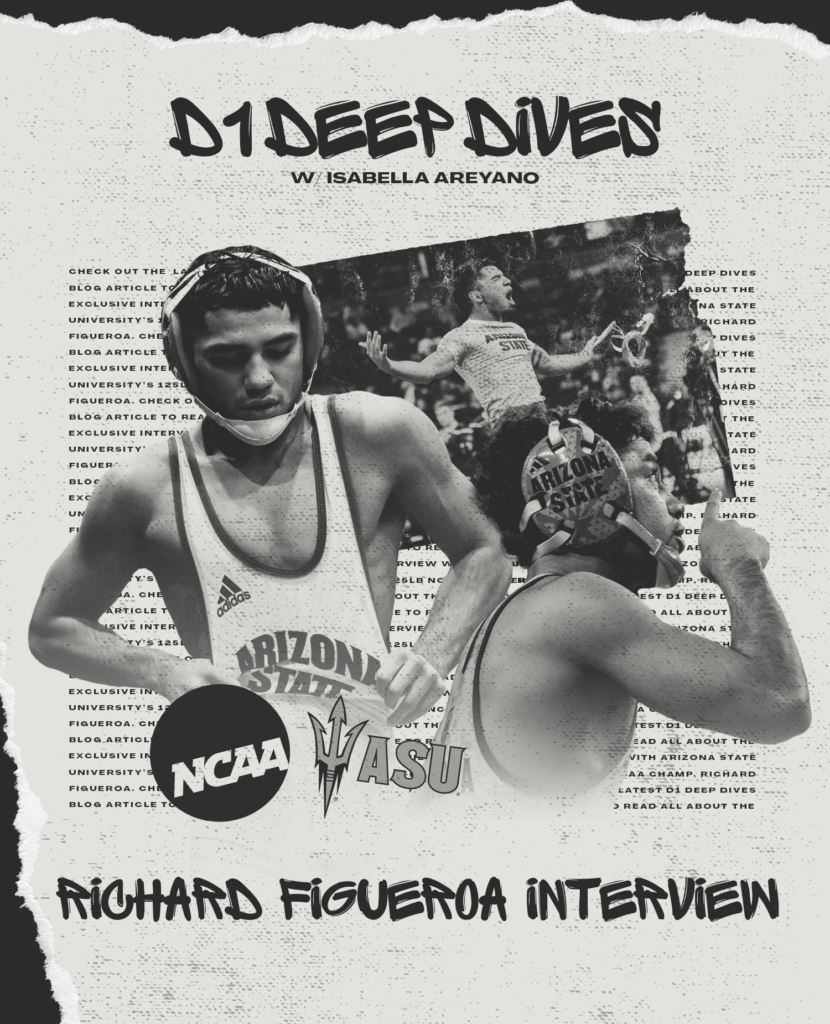By: Isabella Areyano
I had the great pleasure of recently catching up with a childhood friend of mine, Richard Figueroa, who’s now a redshirt junior wrestling at 125 lbs for Arizona State University. To say Richard is a prominent figure in the wrestling world is an understatement. From a young age, Richard has been building a name for himself, from winning national tournaments as a youth to becoming a 3-time California high school state champion. Most recently, he claimed the prestigious title of D1 NCAA Champion at 125 lbs. While I could easily fill pages with his achievements, I wanted to share insights into the side of Richard that doesn’t always make headlines.
Before wrestling became his primary sport, Richard dabbled in other sports like baseball, football, and MMA. As a kid, he was an avid WWE fan, which is actually how his mom “tricked” him into attending his first wrestling practice, luring him in with the enticement of WWE-like action. Though he soon discovered he couldn’t perform moves like the Stone Cold Stunner or The People’s elbow, Richard said he fell in love with the hard work ethic inside a wrestling room. By the time he was 10, he realized he had a natural gift for wrestling. He enjoyed dominating at tournaments and winning big trophies, but it wasn’t until high school that he decided to give up other sports and dedicate himself fully to wrestling. A conversation with his parents helped solidify that decision, with the understanding that wrestling would offer him the best path toward a college scholarship.
At the start of his journey, Richard’s main fear was simply losing. However, that mindset shifted as he entered high school, where coaches like Joey, Sam, Pepe, Cleo, and Valencia taught him the mental aspects of the sport.
“It’s more than just go out there and win,” Richard shared.
He credits the self-talk techniques they instilled in him with helping him jump to new competitive levels, transforming his mindset and boosting his confidence.
Throughout his career, Richard has leaned heavily on his support system—family, friends, coaches, mentors, and God. He expressed immense gratitude for those who have been with him since day one, especially his coaches, who emphasized being a good person off the mat as much as on it. Wrestling is a challenging sport to say the least, and Richard talked about how vital it is to have fun, even in the grind. He emphasized the importance of being friends with your teammates and having those people who make you laugh at tournaments.
As Richard’s career progressed to higher levels, the pressure of competition grew.
“It’s a lot of pressure to feel like you always have to be great,” he admitted.
The weight of expectations, especially under the media’s scrutiny, makes losses harder to deal with. He mentioned how even a close match can leave him anxious about how others—reporters, fans, and the public—might react.
“I feel like I’m a good person, and I just don’t like when people switch up… One day, they say, ‘Oh, he’s the greatest,’ and then if I lose, or have a close match, the narrative changes.”
Last season, he confided in his former teammate, Jacori Teemer, who advised him to unfollow all wrestling pages on social media. Taking that step helped lift a massive weight off Richard’s shoulders, allowing him to focus on his performance without the constant noise of outside opinions.
Even with his massive success, Richard confessed that losses can still take a toll on him mentally.
“Sometimes it feels like the end of the world, even though it’s really not.”
When those dark moments hit, he takes time to reflect, often calling coaches, teammates, or mentors to dissect the match and figure out how to improve for the next one.
When it comes to wrestling at the collegiate level, Richard says it’s “90% mentality, 10% physical and talent.”
His pre-match ritual involves listening to music and repeating to himself, “Let’s go be great. Let’s be the best in the world.”
Interestingly, he embraces pre-match nerves as a good sign: “When I feel the nerves, I know it’s go-time.”
While wrestling has been a cornerstone of Richard’s life, he’s quick to emphasize that it doesn’t define his entire identity.
“I’m from California. I like to have fun with my friends. I like to do adventurous things. I laugh a lot. I like dancing. It’s all about having fun for me.”
At the end of our interview, I asked Richard the question I pose to all athletes: What do you wish more people knew about you? Many are familiar with Richard’s accolades on the mat, but he hopes people see more of his heart.
“I want the best for people, honestly. I care a lot about people. I just want the best for everyone… and showing love to people.”
As a parting thought, Richard offered this message:
“Be your own person. Have fun. It’s not all about wrestling all the time. Just because you’re good at something doesn’t mean it makes you. There are other things that make you.”

Leave a Reply